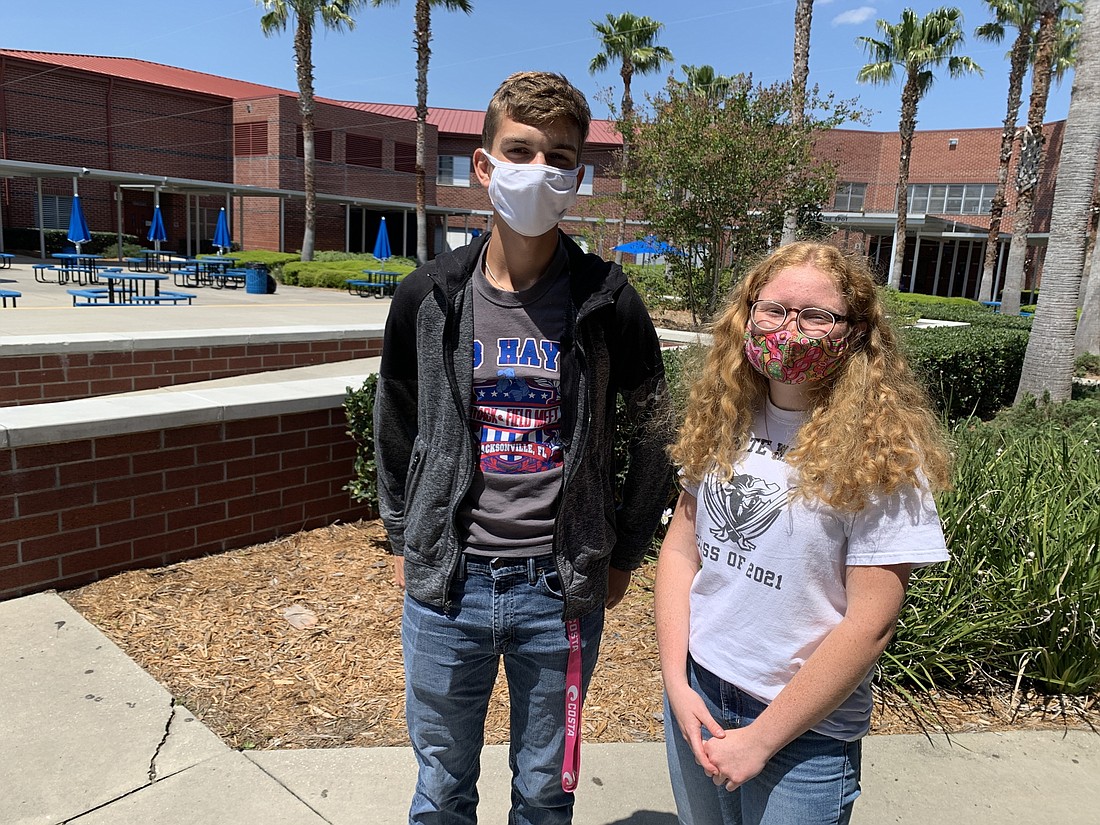- April 18, 2024
-
-
Loading

Loading

Ethan Drost, a junior at Matanzas High School, is in the AICE program, vice president of the Pirates Athletic Committee, a member of JROTC, and he will be the next president of the Leo Club.
Oh, and he can also run a mile in 5 minutes, 30 seconds.
Drost and his friend Sarah Flannery were chosen for Boys State and Girls State this year from Matanzas High School.
Flannery, a senior, has been president of the Leo Club for the past two years. She’s also in the National Honor Society, vice president of the Math Club, volunteered for eight months at the Emergency Department at AdventHealth, works at Winn-Dixie on the weekends, and she played varsity soccer.
In an effort to continue to understand and honor the best and brightest of our local high school students, the Palm Coast Observer met with Drost and Flannery last month at MHS.
Flannery: I try to limit it to less than half an hour. I have a reminder set. It’s easy to get sucked in. The computer knows exactly that I want to see, so I’m fighting an uphill battle. I don’t want to get consumed because it leaves you feeling like you’ve wasted a lot of time. The mindless scrolling part of it can be detrimental because because you compare yourself to what you see.
Drost: I just don’t post anything. I only talk to a few people on social media, and I make sure I’m reserved.
Flannery: I’ve seen it contribute to people’s anxiety because it’s isolating. There are active and passive portions of social media. When you interact with your friends, you come away feeling great. The scrolling is isolating; it gets lonely because you’re not talking to anyone, just seeing what others are up to. I’ve seen a lot of good things come out of it, like social moments in recent months.
Drost: We haven’t really talked about it that much. I go day by day. It’s important to be conscious of it and know what to do when it happens, but I think spending every day worrying about it makes it worse.
Flannery: Not on a daily basis. There are times when I’ve thought that we don’t have the best knowledge of what should be done. There’s a lot of unknowns in that type of situation that you really can’t plan for. But overall, I think our campus is very safe.
Drost: I don’t like sitting down for hours upon hours and plugging away at school work. Doing homework for 30 minutes and taking a five-minute break allows me to get things done with out too much stress or the quality of the work decreasing.
Flannery: I have many rules. I block time, like I’m going to do this for a set amount of time, and I alternate between things that I want to do and things I have to do, and things that are active vs. thing that I’m sitting down for. Also, prioritizing: I learned in a class once that you do the urgent and important things first, then urgent and unimportant, and then important but not urgency. I learned that in Student Success at Daytona State.
Drost: West Point is my dream, and I believe all those things will help me so I can be like my parents and my brothers and my other family. Most of my family have had time in the Army.
Flannery: I’m really driven by the community and knowing that I can help and play a role. Over the years, I’ve found niches that I’ve really enjoyed, and then it becomes a matter of enjoyment and service, which are two great things to have together.
"There are active and passive portions of social media. When you interact with your friends, you come away feeling great. The scrolling is isolating."
SARAH FLANNERY
Drost: Access to technology even from a young age.
Flannery: We’re more connected globally and more socially aware. Some other generations — like the silent generation didn’t want to upheave any social order — but because of the political climate we have, people are more willing to move for change, which is good.
Drost: I think my generation is helping take steps forward. When we are old enough to vote, you’ll see changes.
Flannery: I think it depends on who you talk to. A lot of politicization comes from your family. But a lot of my education on social issues has skyrocketed. Awareness is the first step to making a change. While we don’t have a solution right now, I think we will soon.
"It’s only 6 feet between me and my friends, but its feels farther when it’s every day."
ETHAN DROST
Drost: Take away COVID. Bring back back the chairs with wheels on them— the interactive furniture. It’s much better than just the square desks with rows. I miss sitting at a table with my friends in class. It reduces stress.
It’s only 6 feet between me and my friends, but its feels farther when it’s every day.
Flannery: My sister is a freshman right now. I would add back more AP classes and encourage student involvement. They were so good for me, and I would love for more kids to have that experience.
Drost: For teachers, have a day that isn’t just a lecture. Having something fun makes our day. Encouragement from parent is also very important. Hearing an “I’m proud of you” is something that helps keep me going when things are tough.
Flannery: Spending one on one time and getting to know the young person’s interests and if they don’t know, exposing them to new interests and saying that it’s OK not to know right now what path you want to go on. Sometimes you see all the resources at once, and you don’t know what to do. But guidance, mentorship, getting involved on a personal level is really helpful.